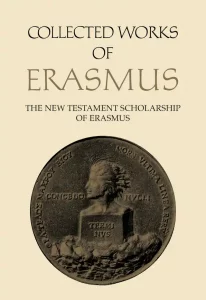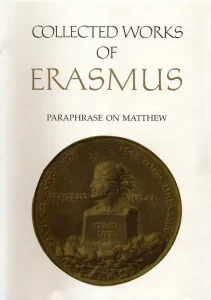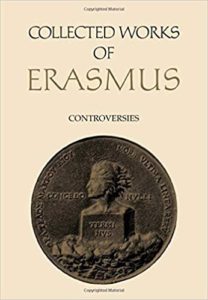
Author’s Corner: Collected Works of Desiderius Erasmus
Each week on Credo we welcome you to join us in the Author’s Corner where we will meet a set of authors whose recent books deserve your attention and might even help you grow in your knowledge of theology, history, philosophy, and the scriptures. We hope the Author’s Corner can keep you up-to-date on the most important books published today and where you can find them.
On today’s Author’s Corner we present you with a selection of works from the University of Toronto Press.
T he New Testament Scholarship of Erasmus, Volume 41 (Toronto, 2019) edited by Robert D. Sider
he New Testament Scholarship of Erasmus, Volume 41 (Toronto, 2019) edited by Robert D. Sider
Erasmus produced his five editions of the New Testament in Greek and Latin and his Paraphrases on the Gospels and Epistles almost contemporaneously with the tumultuous events that accompanied the beginnings of the Reformation in Europe. At the same time, his scholarship was a signal illustration of the Christian Humanism of northern Europe. His remarkable scholarship is translated and annotated in the Collected Works of Erasmus, volumes 42-60, published by the University of Toronto Press.
This volume, CWE 41, seeks to set in perspective in a major introductory essay the full range of that scholarship. It traces the origin of Erasmus’ work and its development over the course of the last two decades of his life, placing the work on the New Testament in the context of his life and the political and religious events of his age, revealing the endeavour as a process, and thus giving the reader illuminating points of reference for the many cryptic allusions in his annotations and paraphrases. The book includes an annotated translation of three of Erasmus’ major writings on Scripture and its interpretation — the Paraclesis, the Ratio verae theologiae (‘System of True Theology’), and the Apologia (defense of his work). It includes as well some of his further attempts to clarify his endeavour — relevant letters and a vitriolic response to his ‘crabby critics’ (Contra morosos). The volume offers a unique insight into the production of Erasmus’ scholarship in book form, illustrating abundantly the special features that made his editions of the New Testament and his Paraphrases both esthetically pleasing and effectively marketable products.
P araphrase on Matthew, Volume 45 (Toronto, 2008) edited by Robert D. Sider
araphrase on Matthew, Volume 45 (Toronto, 2008) edited by Robert D. Sider
Erasmus yearned to make the Bible an effective instrument of reform in society, church, and everyday life. To this end, he composed the Paraphrases, in which the words of Holy Scripture provide the core of a text vastly expanded to embrace the reforming ‘philosophy of Christ.’ Matthew was Erasmus’s first paraphrased Gospel and was thus the great theologian’s first opportunity to set out a full portrait of the life of Jesus.
In this Paraphrase, the wonderful complexity of Jesus’s life finds coherence in the conception of Him as a teacher. The baptism, the dove, and the divine voice attesting sonship are called the ‘inaugurating ceremonies’ that authenticate Jesus as the divine teacher of heavenly philosophy. His students are the disciples, who are to be teachers themselves, initiating an unending line of Christian teachers. The Jesus of this Paraphrase understands pedagogy: He adapts His teaching to the developing abilities of His pupils, quizzes them, and gently rebukes them. His actions as well as His words have one primary objective: to teach the disciples.
As a Preface to the Paraphrase, Erasmus wrote a ‘Letter to the Pious Reader,’ which became one of his most provocative and important essays. Like the more published Paraclesis, this ‘Letter’ vigorously advocates the translation of scripture into the vernacular languages, and proposes a ‘confirmation’ ceremony to encourage young people to assume responsibility for the vows taken for them at baptism by their sponsors.
C ontroversies, Volume 75 (Toronto, 2019) edited by Charles Fantazzi
ontroversies, Volume 75 (Toronto, 2019) edited by Charles Fantazzi
Despite having enemies in the powerful Spanish religious orders, and being warned of the controversies that would arise, Erasmus published the fourth edition of his New Testament in 1527, resulting in a major crisis for Erasmianism in Spain. This period is marked by a bitter dispute between Erasmus and the conservative elements in Spain, involving behind-the-scenes maneuvering, where it was impossible to distinguish friend from foe. Following this tension, a confrontation culminated in the Valladolid conference where enemies of Erasmus were obliged to come forward and where, following these events, Erasmus himself was forced to respond publicly to the charges brought against him.
The three texts in the present volume were written by Erasmus in response to his antagonists, and include An Apologia of Desiderius Erasmus of Rotterdam Against Several Articles Presented by Certain Monks in Spain, The Answer of Desiderius Erasmus to the Pamphlet of a Certain Fever-ridden Individual, and Letter to Certain Highly Impudent Jackdaws.

